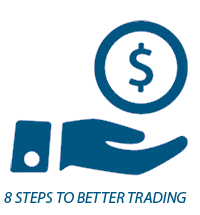Ranking 30 Futures Market Moving Events
Where do I look and when do I pay attention?
By: Justin Smith, Cannon Trading Commodities Broker
Every trader has done it. You've done it, your friends have done it, even your broker has done it at one point early in their career.
Here's the scenario:
You've finally finished your futures education at Cannon Trading Company. You've done you're homework on stops, limits, indicators and price movements for the market you're trading. You're ready to go, you enter your limit order and you wait.
**DING**
You get filled. Your heart rate picks up, a wry smile crosses your face and you begin to imagine the possibilities of the one trade you're in: How much can I make? How much can I lose before it's too much? You've waited through months of technical trading and deep meditation to get here, and now it's finally paying off with one of your first trades in the live market. Sayonara paper trading; aloha live futures.
Then, all of a sudden, the top of the hour hits and the market starts acting up. It's getting more volatile and more volatile; it's picking up speed and taking an unforgiving turn against you. You can't think straight, all you can think about is your losing position that could get worse and worse as the seconds go by. You race to put in a stop order, but you finally have to settle for a market order just to stop the bleeding. You stare.
**DING**
You're out of the market. What the hell just happened? You stare at the screen; did your indicators lie to you? Is your system faulty? Did you not listen to your broker? Well, probably not. But you're down several handles, you've lost some money and your pride is aching.
It was a regular morning, you even patiently waited out the first hour of trading to try and get a better idea of what the day might have in store for the markets; yet in that one minute at the top of the hour the market experienced a major reversal and you have no explanation. You're sitting there scratching your head, furious that you'd prepared for your trade for so long and lost so much in such a short time without any idea why.
You dial Cannon Trading to get an idea of what happened only to find your broker on the other end is just as confused as you are; however they're not perturbed by the market swing, only about your confusion and why you were in the markets at the time in the first place! You're directed to the daily announcements only to find everybody has been waiting all morning for a report to come out that would determine the day or even the next week of trading. And you missed it.
All that technical preparation, the months of practice and pep-talking yourself before you entered the trade, and you were foiled by an announcement that the rest of the trading world saw coming a week ago.
One of the single most frustrating mistakes you can make in the markets is not preparing yourself fundamentally for the announcements of the day ahead, and one of your first steps should be your trading calendar to make sure that doesn't happen. There are about 100 events listed on market announcement sites, and while not every one of them effects the markets as much as the last, it's important that you at least know what each one means.
Cannon Trading Company has taken care of the leg work for you here by polling its brokers (a staff including CTA's and brokers from the floor of Chicago with as much as 30 years experience) to find out which market events they consider to be the most important and what other lessons you need to understand when reviewing the events for the day. The list below is a group of events in order of impact to the markets according to the brokers of Cannon Trading, but there are a few things to keep in mind:
- The importance of all indicators change over time; it's the nature of the markets. When the housing sector was crashing in 2008, you can be sure the housing index numbers were of paramount importance and could actually determine the following week or two of trading while practically forcing a stall before their release in anticipation. A few months ago, the market hinged on scheduled votes from Congress that determined whether or not the US was going to default.
- This poll is no guarantee of market results or swings; in fact, sometimes strangely enough the numbers can pass through the markets undetected. Always take volume and open interest into consideration as they can help determine how much the market will be swayed by a release. Sometimes, even when far-from-consensus numbers are released for a report that people have been waiting on all week, they're a dud. That's just the way of the markets. This list was accomplished not to give you any set of laws, but to help educate you on what your brokers are thinking and what they consider to be market moving events.
- There are hundreds of potential events not listed here that can impact the market. The sample of events here were considered to be the market moving events with the most impact by brokers here; those events were then ranked by Cannon Trading brokers from 1-35. This in not a finished product because of the nature of the markets, and will change in the future. Check back for updates!
- Employment situation — Determined by two labor market surveys. Unemployed persons divided by total number of people in labor force.
- GDP — Gross Domestic Product growth is the most extensive number we have on the economy. A healthy GDP equals a happy economy.
- FOMC Meeting Announcement — What the Federal Open Market Committee has to say regarding the fed funds rate or about adding or subtracting liquidity in credit markets. They decide whether or not we'll see a third round of "Quantitative Easing".
- ISM Mfg. Index — Institute for Supply Management surveys about 300 manufacturing firms across the nation. Indicates whether or not economy/manufacturing is expanding or contracting.
- CPI — Consumer Price Index follows inflation of consumer purchased goods. Essentially it's the cost of goods from the view of the retail buyer.
- PPI — Producer Price Index follows the inflation of the cost to create goods/services. Basically inflation in the eyes of the producer.
- Factory Orders — This is just what it sounds like. Tracks new orders and shipments to monitor demand.
- Consumer Confidence — Also a self-explanatory indicator; this one measures the expectations and attitude consumers have about the US economy. Many economists see this as crucial due to the theory that consumer attitude drives the market up or down.
- ISM Non-Mfg Index — Measures four equally weighted components concerning agriculture, mining, construction, transportation, communications, wholesale trade and retail trade.
- Chicago PMI — Purchasing Manager Index for the "Windy City". Index of business conditions in the area concerning manufacturing and non-manufacturing. A 50% or higher reading indicates an expanding business sector.
- Jobless Claims — Weekly report on first-time unemployment filings; also includes a four week moving average. Measures the strength of the job market.
- Industrial Production — Monthly report covering production of final products, intermediate products and materials. Also includes utilization percentage of the American output facilities.
- Existing Home Sales — Gives a pulse of housing market trends. Counts number of home resales, or existing homes which sold in that month.
- Philadelphia Fed Survey — Closely correlated with the ISM Mfg. Index, this surveys the manufacturing conditions of the Philly Fed district, the largest survey of all the Fed Survey regions.
Now, without further adieu...
MARKET MOVING EVENTS, RANKED BY IMPORTANCE
If you like this Article, Please share!
* According to the Commodities brokers of Cannon Trading Company, Inc.









